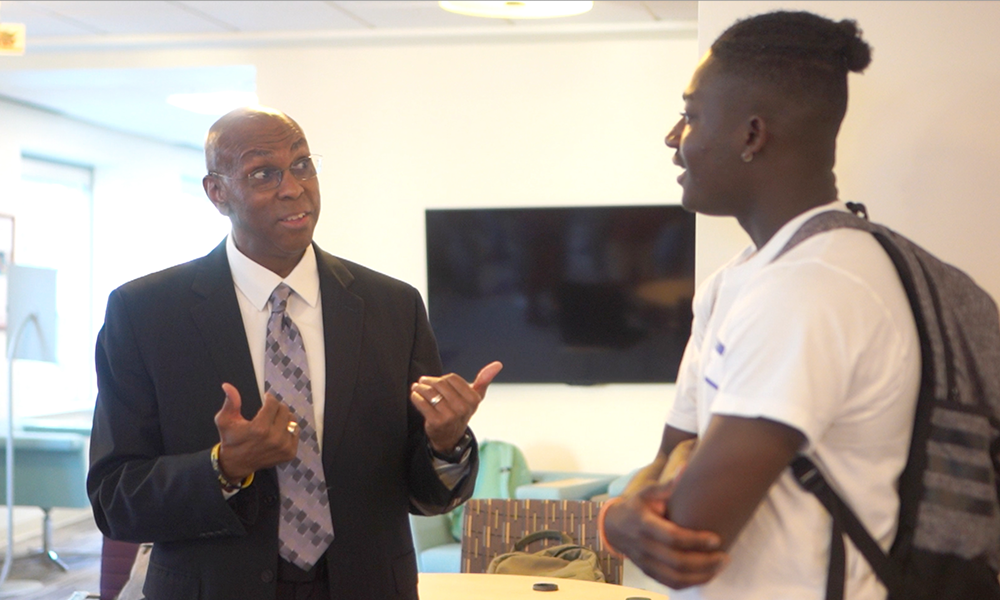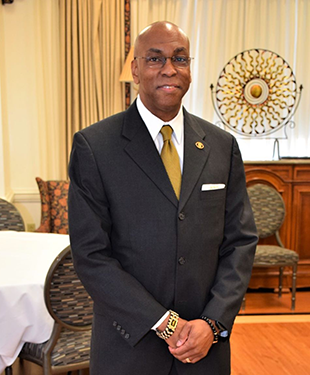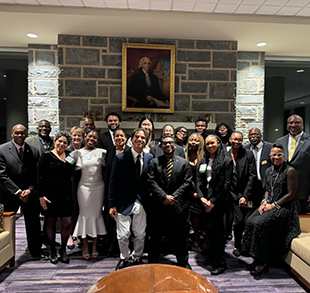'JMU gave me a springboard'
News
SUMMARY: Malcolm Taylor's (‘82) time at JMU started with a chance encounter during a campus tour. Now, after a successful career of service, Taylor and The Ole School Alumni Scholarship Group are changing the lives of students just like him.
A Profession of Service
Malcolm Taylor (‘82), member of the College of Arts and Letters Alumni Advisory Board and of The Ole School Alumni Scholarship Group (OSASG), traces the roots of his meaningful professional and personal experiences to his start at JMU: “JMU gave me a springboard into what turned out to be a wildly successful career beyond what I ever imagined.”
 After majoring at JMU in Social Work with a focus on criminal justice, Taylor spent the next forty years holding increasingly important roles in public safety across Virginia, eventually overseeing probation parole for one third of the state. He retired in 2019 as the CEO of Virginia Correctional Enterprises (VCE, established by the General Assembly in 1934), the first African American to hold the role. VCE is responsible for manufacturing everything from false teeth to furniture, and offering services such as printing, embroidery, and even vehicle conversions for law enforcement agencies. This $50 million, self-sustaining agency provides critical training for incarcerated men and women to prepare them for employment upon return to society.
After majoring at JMU in Social Work with a focus on criminal justice, Taylor spent the next forty years holding increasingly important roles in public safety across Virginia, eventually overseeing probation parole for one third of the state. He retired in 2019 as the CEO of Virginia Correctional Enterprises (VCE, established by the General Assembly in 1934), the first African American to hold the role. VCE is responsible for manufacturing everything from false teeth to furniture, and offering services such as printing, embroidery, and even vehicle conversions for law enforcement agencies. This $50 million, self-sustaining agency provides critical training for incarcerated men and women to prepare them for employment upon return to society.
Fortuitous connections and a willingness to work hard shaped his trajectory, beginning with his start at JMU. A talented high school track-and-field athlete, Taylor was touring campus one day and happened to run into JMU’s then-track coach, Ed Witt, who asked about his college plans. From that chance encounter, Taylor received a full ride. “God looks after fools and babies, and I wasn’t a baby at the time.” He felt conflicted about his motives for initially majoring in Accounting; eventually his interests in the legal profession and the courts led him to Social Work. “Some people would say that was a foolish move, but it was a faith move. I wanted to give back to other people, to help people in some way.”
After interning as a probation officer for the Staunton Court System and enduring a prolonged job search, he took positions working with juveniles: first as a counselor at a residential home for boys with behavioral trouble, Boys Home, then as a case worker and assistant director at Big Brothers Big Sisters.
Those positions showed Taylor the unique contribution he could make and planted the seed for his longstanding commitment to mentoring. At Boys Home, he helped the residents with planning, schoolwork, and behavioral strategies, and established a running club, knowing the value of physical activity especially for young people. “They had never had a minority staff member before,” Taylor recalls, so “a professional person that looked like me was really different. And it was great because I was able to engage with boys of all races.” At Big Brothers Big Sisters, he learned the importance of fundraising and community engagement for enabling values-based programs to exist and thrive.
As Taylor puts it, “hustling for resources — it’s been the story of my life.”
His industriousness repeatedly brought opportunities, some of which he took despite not especially wanting them. He once applied for a new, undefined senior probation officer role solely because hiring from the inside would save another colleague from being bumped. “When asked why I wanted the job,” he says, “my answer was a Malcolm answer: nobody knows what this job is because it’s never existed. But I have a vision for how this position could be an asset to our organization and to the community.”
That vision has always reflected the best interests of the whole team and organization. “I don’t know everything, but I know how to work with anybody,” he says. “As a leader, I didn’t do anything important other than allow people to use their skills.” His service- and relationship-orientated approach to leadership sustained him while working in the important but difficult public safety field. When things got tough and he was tested, he “refused to let them see [him] sweat.” Instead, he would respond, “We can make that happen. What else do you need?”
A Life of Giving
Taylor continues to nurture the passions and interests that ground his humility and adaptability. He is still a runner and has been a minister since 2003. His side gig doing television voiceovers stemmed from radio work begun at JMU’s WMRA. That led to an early-morning radio show in Roanoke that he hosted in the mid-1980s, long before such shows were common, with his friend and fellow-JMU graduate, Stan Tompkins (‘82). Taylor counts Stan and his sister, Deborah Tompkins Johnson (‘78) — former multi-term JMU Board of Visitor member, and Vice Rector until 2023 — among his dear friends. “It’s always about relationships, and that’s been the key to our success. It’s the reason that we stay together because all of us met in the late 1970s or 1980s and we are a family. We’ve been through life together.”
As one of 232 African American students in a population of 8,000, Taylor cherished finding these close friends. “I got a great education at JMU, but I got something even bigger,” he says. “I got a whole extended family that will be with me until I’m dead and beyond. It’s a big deal.” Together they wanted to help students coming along behind them, “when the next Malcolm Taylor shows up not understanding that you gotta pay for college.”

Charles May (‘83) and 11 other Dukes founded the non-profit organization Ole School to support African American recruitment and retention efforts. Serving as vice-president of OSASG, Taylor drew on his relationships and experiences with mentoring, fundraising, and creating something new to address a demonstrated need. As the enthusiastic OSASG team grew, the group expanded its scope to support all underrepresented students or, as Taylor says, “anyone who requests it.” OSASG currently works with a cohort of about seventy-five students.
Their efforts have also evolved from recruiting and offering scholarships — two at first, now up to fourteen — to mentoring current students and, recently, helping them find internships and/or full-time employment upon graduation. The group has grown increasingly integrated into JMU’s overarching, mission-driven efforts to diversify and support the student body.
Taylor recognizes that each person has something different to offer; he values equally the three T’s of giving: time, talent, and treasure. Not everyone can give financially, but they might offer an internship or job, mentorship, or a unique story. “It doesn’t have to be a lot. Even if what you have is small,” he advises, “make a contribution. Give what you can.”
Wide-ranging as Taylor’s support is, his heart ultimately lies with the students, who have many options with a liberal arts degree. He earned his degree to do one type of thing and ended up growing into a bi-level administrator helping run the state system for public safety. To students, he says: “Keep your eyes open and your head on a swivel because opportunities will come because of this education and degree that you’re going to receive.”
